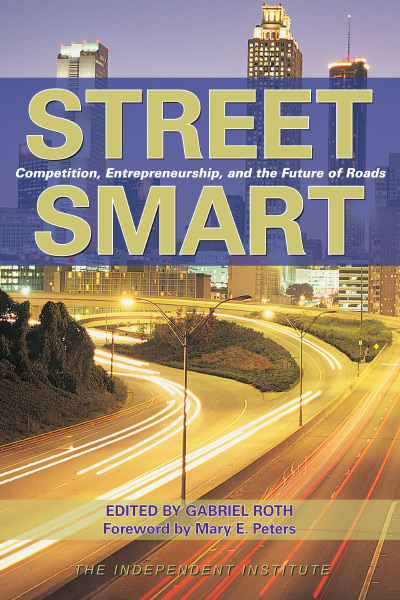| List Price: | ||
| Price: | $25.45 | |
| Discount: | $4.50 (Save 15%) |
| List Price: | ||
| Price: | $25.45 | |
| Discount: | $4.50 (Save 15%) |
Overview
Effective road transportation is crucial to economic and social well-being. Yet in cities worldwide, existing road systems suffer from government policies responsible for traffic congestion, unsafe conditions, high costs, political corruption, waste and pork, environmental degradation, and poor maintenance.
Street Smart examines private, market-based alternatives for road services, both in theory and practice. The book explores at least four such possible directions for private services, including testing and licensing vehicles and drivers; management of government-owned road facilities; franchising; and outright private ownership. The book further traces the history of private roads in Great Britain and the United States and examines contemporary examples of entrepreneurial innovation in road pricing, privatization, and marketization in environs as diverse as Singapore, California, Ghana, Norway, and England.
The main obstacle to private road services rests with political classes reluctant to give up their lucrative sources of power, wealth and influence through current government road monopolies. However, those seeking responsive road services determined by the free interplay of consumers and private suppliers will find that Street Smart lays the intellectual groundwork for the badly needed overhaul of road-transportation policy.
Contents
Acknowledgment
Foreword by Mary E. Peters
I Introduction
- Why Involve the Private Sector in the Provision of Public Roads?
Gabriel Roth
II Theory, Arguments, and Ideas
- De-Socializing the Roads
John Semmens - Do Holdout Problems Justify Compulsory Right-of-Way Purchase and Public Provision of Roads?
Bruce L. Benson - The Political Economy of Private Roads
David Levinson - Improving Road Safety by Privatizing Vehicle and Driver Testing and Licensing
John Semmens
III Improving the Pricing of Roads
- Congestion Pricing: The Singapore Experience
Gopinath Menon - Congested Roads: An Economic Analysis
with Twin Cities’ Illustrations
Herbert Mohring - Estimating Congestion Prices, Revenues, and Surpluses: An Example from Manila
Gabriel Roth and Olegario G. Villoria, Jr. - HOT Lanes in Southern California
Edward C. Sullivan - How Should the Revenues from Congestion Pricing Be Spent?
Kenneth J. Button
IV History of Privately Provided Roads
- The Rise and Fall of Non-Government Roads in the United Kingdom
Bruce L. Benson - America’s Toll Road Heritage: The Achievements of Private Initiative in the Nineteenth Century
Daniel Klein and John Majewski - Streets as Private-Sector Public Goods
Fred E. Foldvary - Private Roads to the Future: The Swedish Private Road Associations
Christina Malmberg Calvo and Sven Ivarsson - Role of the Private Sector in Managing and Maintaining Roads
Gunter J. Zietlow
V Roads to Privatization: Getting from Here to There
- New Zealand’s Path to a Good Road
The Hon. J. K. McLay - Development of Highway Concessions on Trunk Roads in the United Kingdom
Neil Roden - Commercializing the Management and Financing of Roads
Ian G. Heggie - HOT Networks: A New Plan for Congestion Relief and Better Transit
Robert W. Poole, Jr. and C. Kenneth Orski - The Way Forward to the Private Provision of Public Roads
Peter Samuel
About the Contributors
Index
Detailed Summary
- Poorly maintained vehicles and incompetent drivers contribute enormously to the 1.17 million deaths and 10 million serious injuries that occur annually on the world’s roads. Whereas road vehicles and their drivers are tested and licensed by government agencies, which lack the incentive of a financial interest in safety, in the maritime sector ships and crews are tested and licensed by insurers, and safety is traditionally taken very seriously. If insurers were responsible for testing and licensing cars and drivers in the United States, what would they do differently than the Department of Motor Vehicles? (ch. 5)
- Electronic charging methods enable road use to be charged and paid for without toll booths, and even without vehicles having to stop, thus overcoming a major impediment to market provision. Why not expand their use to alleviate urban traffic congestion, as Singapore has done? (ch. 6, 9)
- Roads have been cited as examples of “public goods” that for economic reasons can be provided only by governments, but that perception is false. In the late 18th and 19th centuries, thousands of miles of privately provided roads covered parts of England and the United States (ch. 11-12). Today, the SR91Express Lanes in Southern California (ch. 9), Canada’s Highway 407 near Toronto, the U.K.’s M6 motorway and Dartford Crossing (ch. 17), and Sweden’s privately operated rural roads (ch. 14) show that private roads are making a comeback. Fullscale privatization offers enhanced performance, less concern with politics, lower costs, better information, quicker implementation (ch. 3), ability to finance expansion, and competition (ch. 3, 9, 13).
- Outsourcing road maintenance to the private sector can greatly reduce road maintenance costs: Brazil saved 20% by outsourcing; Colombia saved 50%. Long-term performance-based contracts are especially attractive because they leave contractors free to determine how best to meet the standards specified in the contract, thereby creating strong incentives for efficiency. The contracts can spur innovation not only in maintenance, but also in road condition assessment, safety management, traffic control, and emergency response. If countries in Europe, Africa, and Latin America are benefiting from the use of performance-based contracts, why is the United States, with its $200 billion backlog of road maintenance, slow to adopt them? (ch. 15)
- High-Occupancy Toll “HOT” lanes have been operating successfully in Southern California for ten years, and have given travelers the choice of buying congestion-free travel. HOT Networks could offer similar choices in Miami, Atlanta, Dallas, Houston, Seattle, Washington, D.C., San Francisco Bay Area, and Los Angeles (ch. 19).
Effective road transportation is crucial to economic and social well-being. The quality of our road systems helps determine whether we will be involved in a traffic accident, the response time of emergency service, the cost of our car insurance, whether we arrive at our jobs in a good mood, the quality of the air we breathe, whether the shelves of our local stores are well-stocked, and much more. Road systems around the world, however, suffer from traffic congestion, unsafe conditions, high costs, political corruption, waste and pork, environmental degradation, and poor maintenance. Fortunately, many of the world’s roadways can be dramatically improved by applying the same principles that have brought significant improvements to telecommunications networks.
Street Smart: Competition, Entrepreneurship, and the Future of Roads, edited by Gabriel Roth, provides “road maps” for the fundamental reform of road services by examining innovative directions for market-based reforms, including private testing and licensing of vehicles and drivers, private management of government-owned road facilities, franchising, and outright private ownership. An interdisciplinary approach to road reform, Street Smart draws on subjects as diverse as economics and public-policy analysis, engineering and technology, the history of private roads, and case studies of recent market-based reforms in the United States, the United Kingdom, New Zealand, Sweden, Singapore, and elsewhere.
“The time has come to unleash the power of the private sector to deliver the innovation, cost savings, quality, and choice it has delivered in telecommunications and other industries,” writes former U.S. Federal Highway Administrator Mary E. Peters in the book’s foreword. Street Smart takes us closer to the destination of safer, more efficient roadways by showing policymakers, transportation managers, entrepreneurs, and general readers how and why road services should be re-engineered by using effective, marketbased approaches.
Theory, Arguments, and Ideas
Street Smart begins by addressing a basic question about reforming road services: What are the benefits and barriers to relying more on private companies? In chapter 1, Gabriel Roth argues that road systems, especially outside the United States, need to be changed because excessive costs are associated not only with congestion but also with political control of roads—including losses of personal freedom to those who strive for mobility. In chapter 2, John Semmens examines the failures of traditional highway finance, such as the inefficiencies of road taxes, the perverse incentives to shift costs to others, and the political uses of bad roads.
In chapter 3, Bruce Benson explains that eminent domain is not necessary for the provision of roads; private companies, such as pipeline suppliers, can negotiate different routes with different groups of landowners, and generally do not need to resort to government-sanctioned coercion. In chapter 4, David Levinson examines the political obstacles to the privatization of local streets, intercity freeways, and connector roads. In chapter 5, John Semmens explains why local authorities have weak incentives to stop uninsured drivers and proposes promising low-cost solutions—such as the development of electronic license plates that insurers could remotely “switch off” so that uninsured drivers could be promptly apprehended.
Improving the Pricing of Roads
In chapter 6, Gopinath Menon describes Singapore’s 30-year experience with congestion pricing. In chapter 7, Herbert Mohring shows how the principles of industrial-organization economics shed light on transportation and roads, particularly regarding traffic congestion. He then uses these principles to derive optimal tolls for a highway network modeled after those in Minneapolis- St. Paul. In chapter 8, Gabriel Roth and Olegario Villoria use data from traffic congestion in Manila to show how optimal congestion prices are calculated and to estimate the potential profitability of Manila’s roads.
In chapter 9 Edward Sullivan explains how the tolled express lanes introduced in the 1990s on routes SR 91 and I-15 in Southern California operate. These lanes are subject to tolls, electronically collected, and varied to ensure that the lanes are free of congestion at all times. Although most economists support the principle of levying additional charges for the use of congested roads, there is no unanimity about the disposition of the revenues. In chapter 10, Kenneth Button discusses the economic and political aspects of this question on the basis of the experience in Norway and Central London.
The History of Privately Provided Roads
One argument made against allowing more private roads to be developed is that they would not be provided extensively because of roads’ “public goods” character. In chapter 11, Bruce Benson discusses the extensive network of privately provided roads that existed in Britain since Medieval times and disputes that claim. He describes the 17th century development of the toll-financed “turnpike trusts” and their demise in the 19th century due to public opposition to tolls. In chapter 12, Daniel Klein and John Majewski review the history of privately provided toll roads in 19th century America. In the light of the achievement of the private toll roads and their decline during the Progressive era, they conclude that any presumption about government dominating the field of road provision must be reconsidered.
In chapter 13, Fred Foldvary disputes the view that local roads must be publicly provided to protect residents from excessive charges. Just as a hotel guest is not exploited by the hotel’s ownership of its hallway, Foldvary argues, so a member of a residential association could benefit from her association’s ownership of a private street—a point he illustrates with examples from the United States. In chapter 14, Christina Malmberg Calvo and Sven Ivarsson describe the private road associations that own and manage numerous rural roads in Sweden, with government encouragement. Private firms frequently maintain roads in accordance with government specifications. In chapter 15, Gunter Zietlow discusses a performance-based alternative to such arrangements, whereby road owners (generally governments) specify only the condition required of the roads and let contractors choose the means to meet these requirements.
Roads to Privatization
The Hon. Jim McLay, former Deputy Prime Minister of New Zealand, chaired a commission which advised the government on road financing and related issues. In chapter 16, he describes New Zealand’s efforts to improve the organization, management and financing of roads. In chapter 17, Neil Roden describes how the Private Finance Initiative (PFI) became established in the United Kingdom as the procurement method of choice for many projects. In chapter 18, Ian Heggie describes the efforts by governments, aided by international assistance in which he was involved, to bring roads into the marketplace, put them on a fee-for-service basis and manage them like a business. Much of this work involved setting up “Road Boards” and “Road Funds” to de-politicize and to commercialize road management and financing.
On the basis of the successful High-Occupancy Toll “HOT” lanes in Southern California, Robert W. Poole, Jr. and Kenneth Orski, in chapter 19, develop the concept of “HOT networks” to give major urban areas networks of congestion-free roads for the use of buses and tolled vehicles. Tolls would be collected electronically, without vehicles having to stop, and varied to ensure congestion- free conditions at all times. They sketch and evaluate HOT networks for eight U.S. urban areas. In chapter 20, Peter Samuel pulls together many of the ideas developed in earlier chapters to propose a program for moving roads from the government to the private sector. His chapter concludes with suggestions for major privately financed road improvements in the Chicago, Los Angeles, New York City, and Washington, D.C., areas.
Praise
“Street Smart, is informative, up-to-date, and a pleasure to read. If we are lucky, the book’s ideas and insights will also find their way into popular and political discourse in order to create real reform.”
—Peter Gordon, Professor of Policy, Planning and Development, University of Southern California
“What a successful and important book Street Smart is. This is a book which makes plain the importance of a market economy in roads for the efficient allocation of scarce resources and the satisfaction of the user, worldwide.”
—John Hibbs, OBE, Professor of Economics, University of Central England
“Top 10 Books of 2007: Street Smart provides a cogent challenge to the public sector’s monopoly on roads. In this provocative and enlightening compilation, the leading thinkers on privatization put forth market-based solutions for providing roadways and dealing with traffic congestion. Contributors to the volume provide both historic and modern day examples of private sector road services, and outline the case for taking politics out of transportation and unleashing the power of competition. A valuable resource for understanding the argument for privatization.”
—Planetizen, The Urban Planning and Development Network
“Roads are so critical to everything in society that many presume that they must necessarily be a governmental enterprise. Street Smart dispels that faulty impression with a careful examination of the past, present, and promising future of private roads.”
—Damian J. Kulash, former President, Eno Transportation Foundation
“Street Smart should help to develop thinking on the future of the road network and should be welcomed by road users in all countries.”
—Edmund King, Executive Director, Royal Automobile Club Foundation
“Every public official—whatever their views—needs to read Street Smart to understand the depth of what is becoming a revolution.”
—Roger Toleman, Deputy Secretary, New Zealand Ministry of Transport
“In this comprehensive volume, editor Gabriel Roth has assembled 20 essays that collectively make a powerful case that streets and roads can and should be privatized by the free market. . . . Street Smart is an extremely valuable compilation of theory, arguments, and evidence in support of the proposition that a network of privately owned streets and roads operating on the user-fee principle is feasible and far superior to the old model of tax-financed, government-operated streets and roads. Road privatization should be to the early 21st century what the communications revolution was to the 20th and hopefully, this book will play an important role in bringing that about.”
—Regulation
“Although, as a socialist, I find it difficult to accept that roads should be privatized, as a transport professional I believe that Street Smart is essential reading for those of us struggling with the problems of efficient transportation”
—Dave Wetzel, Vice Chair, Transport for London
“Street Smart assembles a first-class group of international analysts to address some of the thornier questions of the day in transportation with intelligence and clarity. Public policy will be edified by this discussion.”
—Alan E. Pisarski, Committee Chair, Transportation Research Board
“Toll roads historically are not particularly uncommon. Street Smart looks at this history and examines the prospect of reviving private roads as a major transportation tool. This book provides a clear-cut and comprehensive investigation of the prospect of either replacing or supplementing our present road system by private, market-based roads. It should start a serious and informed discussion of this important problem.”
—Gordon Tullock, University Professor of Law and Economics, George Mason University
“Roads and highways have rapidly transitioned from a relatively low profile on the public policy radar screen to one of the most vexing infrastructure issues facing public employees, elected officials and politicians at all levels of government. . . . Into this frustrating complex environment comes a timely new anthology of some of the best recent thinking on how we deal with the demand for new roads and highways. Street Smart pulls together approximately 20 contributors—not only from around the United States, but also from Sweden, the United Kingdom, New Zealand, Singapore, Germany and the Philippines. It is a diverse group of academics, engineers and economists, all of whom have stellar credentials in diverse fields relating to the finance, construction and economics of road systems. The volume is clearly organized and edited by Gabriel Roth, a transportation economist with substantial international experience with the World Bank. . . . As cutting edge as some of these discussions are, I particularly enjoyed the segment of Street Smart that reviewed the history of private roadways in America, England, and elsewhere. . . . Overall, this is an admirable work and one that should be on the shelves of America’s transportation policy makers. . . . This is a valuable work. The distinguished engineers, economists and academics who contributed to this volume are trying to lead the way. Let’s see who follows.”
—Journal of Transportation Law, Logistics & Policy
“Street Smart presents a compelling case that highway privatization can be applied in the public interest. Road users and highway advocates will learn much about the promises and pitfalls of private-road proposals and be ready to engage in this crucial debate on the future of American surface transportation.”
—Greg Cohen, President, American Highway Users Alliance
“Street Smart contains a wealth of useful theory, case studies, and practical advice about a very important piece of future road policy. Expert authors provide valuable information about how private roads can be structured, from U.S. turnpikes of the past to current-day experience all over the world.”
—Kenneth A. Small, Professor Emeritus of Economics, University of California, Irvine
“Street Smart is a fascinating and challenging book which offers original and refreshing contributions on rational market opportunities for the transport sector, in particular the private management and financing of road infrastructure. Strongly recommended.”
—Peter Nijkamp, Professor of Economics, Free University, Amsterdam
“Street Smart is a ‘must’ for college-level students of transportation and urban planning: it considers private, market-based alternative for road services both at the idea level and in practical application, considering the history of the private provision of roads before the railway age and how modern planning can look back at lessons from the past to plan for the future. Four different ideas for private services, from testing vehicles and drivers to managing road facilities and using franchise or private ownership, provide different avenues for solving many of today’s road issues, from congestion and safety issues to high costs and politics.”
—Midwest Book Review
“Private turnpikes were commonplace in the eighteenth and early nineteenth centuries but they eventually succumbed to competition from railways and onerous government regulations. Street Smart makes an eloquent and convincing argument that the time is ripe for the private sector to make a comeback with a boost from modern electronic tolling technology and innovative contract designs. . . . Written by leading economists, engineers and other professionals, Street Smart is essential reading for academics, policy analysts and policy makers, as well as firms contemplating involvement themselves.”
—Charles R. Lindsey, Professor of Economics, University of Alberta, Canada
“In Street Smart, Roth and his collaborators present the case for privatizing the provision and operation of roads. In addition to presenting theoretical arguments for road privatization (which largely echo standard arguments for privatizing public utilities), chapters discuss different methods of road pricing, historical experiences of privately owned roads, and policy approaches to road privatization.”
—Book News
“This book will be useful to both theorists and practitioners of road transportation. . . . And make no mistake, the book demonstrates a strong case for more reliance on private providers responding to market forces. It contains many bold statements on the efficacy of highway privatization toward meeting the public interest in more effective and efficient road transportation. Certainly, efficiency must be improved, both in the allocation of resources and in their application. These authors, for the most part, make a firm case that turning to the private sector is a significant part of the solution. . . . Economists will find much familiar in this book.”
—Journal of the Transportation Research Forum
“When roads are safe, logically designed, and well maintained, everyone benefits. Unfortunately, many of the government systems in place to build, allocate for, and manage roads around the world are either inefficient, corrupt, or both. In Street Smart, an international group of policy experts examine market-based alternatives for road services. According to the authors, the main obstacle to the private provision of roads is public ignorance.”
—The Futurist
“Believe it. Street Smart, a new transportation book on the market, says the time has come to bring streetcars back to cities.”
—Pittsburgh Post-Gazette
“The raise-the-cost crowd promotes toll roads, fees that make rush-hour driving more expensive than off-peak travel, and taxes based on the number of miles you drive rather than on the amount of gasoline you buy. Free-market proponents support the pricing option, arguing that congestion is a classic tragedy of the commons. ‘The root cause of traffic congestion is the absence of property rights in roads,’ Gabriel Roth and Olegario Villoria, transportation experts, argue in Street Smart, a new book published by the Independent Institute, based in Oakland, Calif.”
—National Journal
Awards
2008 Sir Antony Fisher International Memorial Award
- Winner in “Established Institutes” Category
2017 Planetizen “Top 10” Books List
- Member of the Top 10 in Urban Planning, Design, and Development Community















